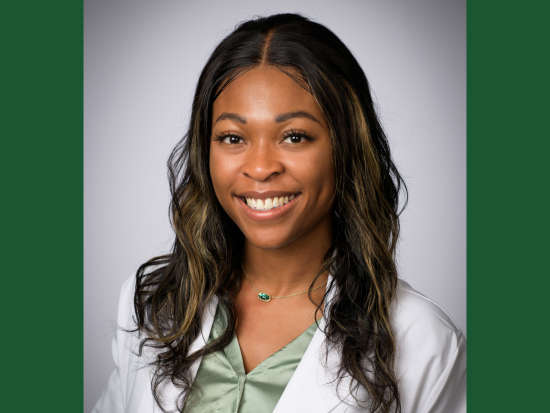 UAB General Surgery Resident Michelle Onuoha, M.D., shares her journey into surgery and the influences that inspired her to pursue a career in medicine.
UAB General Surgery Resident Michelle Onuoha, M.D., shares her journey into surgery and the influences that inspired her to pursue a career in medicine.
Tell us a little bit about yourself—your background, what led you to medicine, and ultimately to surgery?
I was born in Austin, Texas, and did most of my schooling there. I completed my undergrad at UT Dallas and then went to medical school at Texas Tech. My parents are from Nigeria, and I am the first in my family to go to college and become a doctor. Most of my family is still back in Nigeria, and their experiences have had a significant influence on me.
I have always been interested in medicine, but I never seriously considered surgery until my third year of medical school during my surgical rotation. A significant reason for that was my lack of exposure. Coming from a family that has long struggled with access to healthcare—an even greater challenge in Nigeria—I have always been passionate about serving all populations. This passion became my mission in medical school, where I helped run a free clinic.
Once I realized I wanted to be a surgeon, I sought a training program also committed to serving as many patients as possible. Given the demands of residency, I knew I would have limited time to volunteer outside of my training, so I wanted this mission to be an integral part of my experience. This commitment was one of the key reasons I chose UAB.
What was your first impression of the healthcare field, and what ultimately convinced you to pursue a career as a surgeon?
Initially, I thought I would pursue emergency medicine. With my mother working as a nurse and my father driving a city bus, most of my exposure to healthcare came through emergency settings.
Working as a scribe in the ED, I enjoyed the fast pace and hands-on nature of the work. However, when I started my clinical rotations in internal medicine, I found myself drawn to the ICU, especially because of the procedures. I briefly considered pulmonary critical care, thinking it would be the right fit.
Then came my surgery rotation, which began in a burn ICU. I was captivated by the ability to not only manage critically ill patients but also take them to the OR and provide definitive treatment. That changed everything. Even though I tried to resist—knowing how demanding surgery is—nothing else gave me the same level of fulfillment.
Do you have any personal or public figures who have inspired you along your journey?
As corny as it sounds, my parents are my biggest inspirations. They immigrated to the U.S. as adults and had to navigate an unwelcoming and unfamiliar environment. They worked hard to provide a better life for me and my siblings, often putting themselves in uncomfortable positions so that we could have better opportunities.
That has shaped how I approach both my career and my interactions with others. I want to do for others what they did for me, whether it is mentoring students or being a role model for patients who might not have ever seen a Black surgeon before. I have had young patients or their family members tell me they never expected their doctor to look like me. Those moments are so powerful because representation matters—it affects how people perceive what is possible for themselves.
Is there anything you would like to share with others about your perspective on caring for patients from diverse backgrounds?
I would say one of the biggest things is to always keep in mind that you do not know the full context of your patient's experience. Getting to the hospital can be a huge step for some people.
I have learned that taking even a little extra time to listen and reassure patients can make a huge difference. Medicine is not just about treating the illness—it is about treating the person. If we approach care with that mindset, we can build trust and make meaningful changes in healthcare.
Surgery
•
July 02, 2025